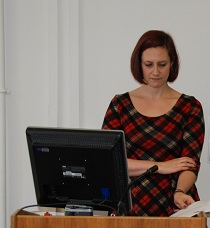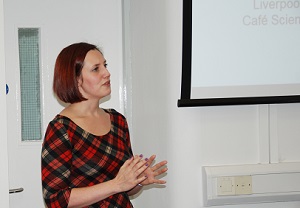
Ecology researcher Dr Kate Allen paid a visit to JMU this week to talk to students about why science reporting is important and how it matters to journalists and readers.
Dr Allen works at the University of Liverpool, where she has completed research in the field but currently works mainly in an office environment, producing graphs, charts and reports.
Clearly passionate about communicating science, the nature lover has a PhD, the topic of which was the conservation of a particular species of dragonfly.
She spoke about her love for the outdoors, which is how her interest in science and ecology grew, despite not having any family background of scientists.
Dr Allen recalled: “I didn’t always want to be an ecologist. When I was at school I wanted to be a vet and then I didn’t get into vet school.
“Then I thought I will go and do zoology because that sounds similar!”
Dr Allen explained to students how science news is sometimes reported by the media in a negative manner, and talked about the ways in which misunderstandings can occur between scientists and journalists.
She warned that some scientists are keen on self-promotion and should be approached with the same sceptical as other sources.
Dr Allen used real-world examples to highlight some common pitfalls of science reporting in the media.

Talking about the controversial reporting of the alleged link between MMR vaccines and autism in the late 1990s, Dr Allen said: “The problem here is scientists are not very good at communicating risks and probability, and journalists tend to report the worst case scenario and this can lead to news stories that don’t really reflect the true scientific understandings.”
Offering practical advice throughout her lecture, Dr Allen delivered a series of useful tips to trainee journalists, helping them understand the difficulties their work as journalists could create if science articles they publish are not presented in a balanced way to readers.
Using the contradicting reporting of the global warming issue as an example, the scientist said: “The media does not have a great image as a whole; I think it’s fair to say.
“I think a lot of what is published does not represent balanced opinion in the scientific community.
“I think responsible reporting could have a massive impact on that but a lot of the time it’s irresponsible and has the opposite effect,” she added.
Dr Allen concluded by pointing out the positive work that some journalists and the media are doing by reporting balanced and accurate scientific research and articles to the general public.
The lecture was supported by the Royal Statistical Society, which aims to promote the use and awareness of statistics for public benefit.
Download the lecture handout from Blackboard (LJMU students and staff only)

